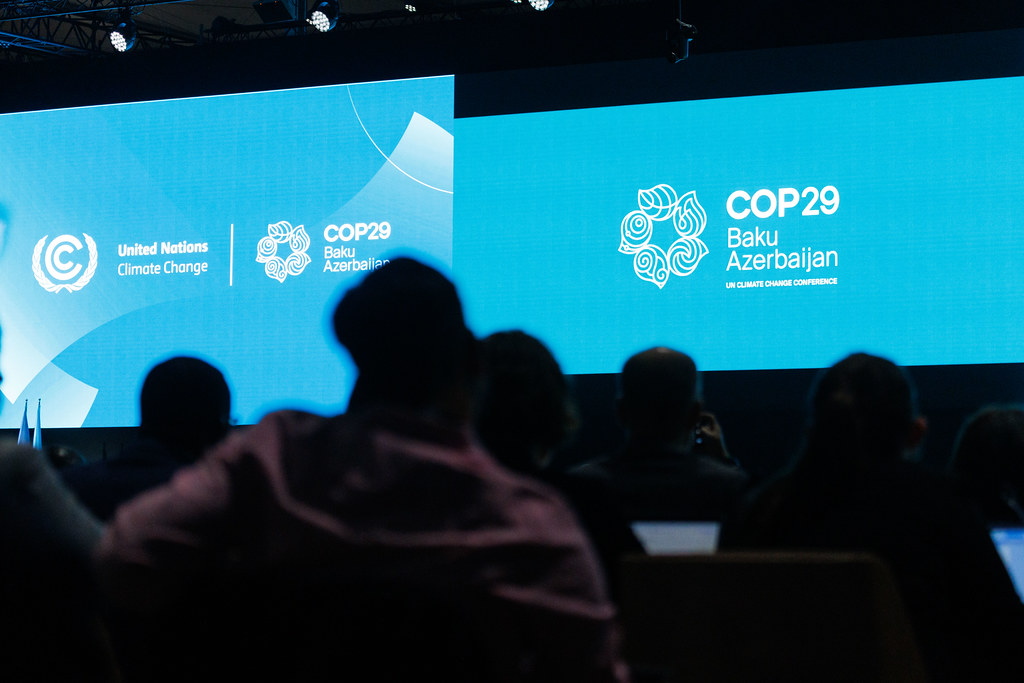
COP29 is taking place from Nov. 11 to 22 in Baku. (Photo: UN Climate Change - Kamran Guliyev)
The United Nations Climate Summit (COP29) is currently in full swing, with ASEAN member states, consisting of developing countries, actively participating. RECCESSARY will closely monitor the actions and statements of ASEAN countries during the conference and provide ongoing updates to this article.
Philippines to lead Loss and Damage Fund Board for climate vulnerable communities
On the second day of the COP29, the Philippines signed the Host Country Agreement (HCA), formally taking responsibility for managing the United Nations' Loss and Damage Fund. This move positions the Philippines to play a key role in coordinating climate recovery and reconstruction efforts for vulnerable nations and paves the way for future climate finance advocacy for the country.
The establishment of the Loss and Damage Fund aims to assist countries severely impacted by climate change, enabling them to recover and rebuild when they are unable to do so on their own. Under this initiative, developed nations will provide financial support. The Philippines was selected in July of this year as the host country for the Fund, acting as a communication bridge between the World Bank and the 26 member countries.
Philippine Environment Secretary Maria Antonia Yulo-Loyzaga, who attended the agreement signing, stated, "we are fully committed to ensuring its smooth, transparent, and effective operations, and the signing of this agreement establishes the framework and services for the Board to function in the Philippines." She also emphasized the importance of the Philippines' role as host country.
According to the official COP29 press release, the Fund, combined with Sweden’s recent pledge of $19 million, now totals $720 million. The United Nations Environment Programme (UNEP) cites a study revealing that global damages from climate change amount to at least $2.8 trillion, equating to a loss of $16 million per hour.
COP29 President and Azerbaijan’s Minister of Ecology and Natural Resources, Mukhtar Babayev, remarked, " This progress will allow us to finally turn pledges into real support. That means that funding will be able to flow in 2025."
In addition to signing the agreement, the Philippines outlined another 3 key priorities for its participation in the climate summit. These include climate financing, adaptation, and a just transition, with a particular emphasis on realizing the commitment to provide $100 billion annually in climate financing for developing countries.
As the leader of the Philippine delegation, Yulo-Loyzaga also highlighted the country’s focus on ocean and land biodiversity, food and water security, climate migration, urban resilience, and the development of carbon and biodiversity markets.
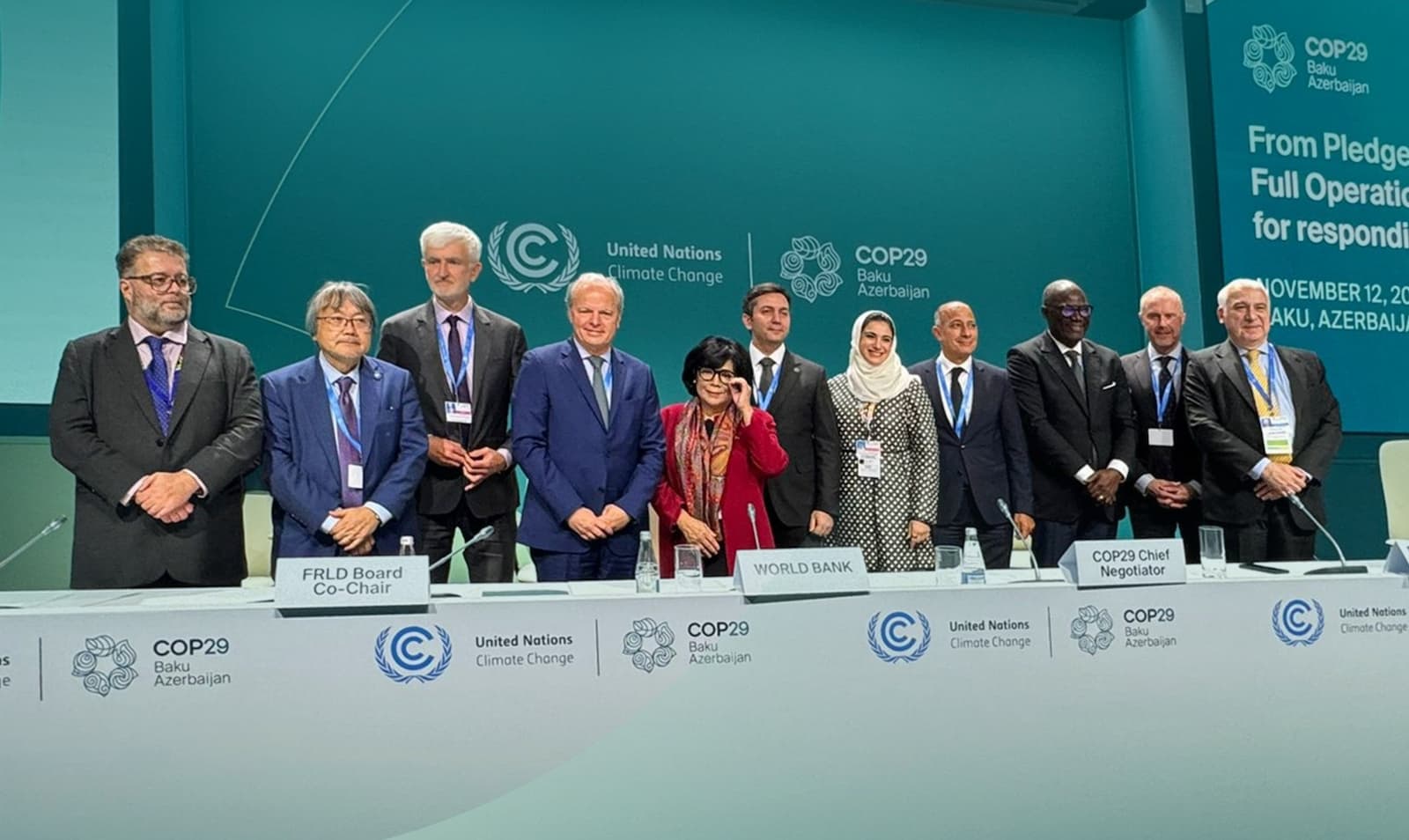
The Philippines signed the Host Country Agreement at COP29, officially taking charge of the UN’s Loss and Damage Fund. (Photo: COP29)
Singapore enhances green financing, carbon credit development
During the COP29, Singapore announced that it would provide a matching fund of up to USD 50 million to support green transformation in Asian countries. Additionally, the government introduced a new subsidy program for high-quality carbon credit trading to assist companies in early-stage development and financing.
Grace Fu, Singapore’s Minister for the Environment and Water Resources, revealed the matching fund initiative via a pre-recorded video at the opening ceremony of Singapore's pavilion on Nov. 12. "Singapore is doubling our efforts to mobilize financing to support the global climate action," Fu said. The government aims to incentivize more green investments or financing sources by offering concessional capital on a matching basis.
Last December, during COP28, Singapore introduced a blended financing initiative, the Financing Asia’s Transition Partnership (FAST-P), with a goal to raise USD 5 billion from both public and private sectors. The matching fund is a supplementary measure to expedite fundraising efforts.
On the same day, the Singapore Economic Development Board (EDB) launched a new subsidy program for carbon credit development, focusing on high-quality carbon credits as defined under Article 6 of the Paris Agreement. The program targets Singapore-based companies that have successfully developed carbon credits, with over 120 companies in Singapore’s carbon management supply chain.
Additionally, during the climate summit, the Singapore government submitted its first Biennial Transparency Report to the United Nations. The report forecasts that Singapore’s carbon emissions will peak in 2028 at 64.43 million tons, marking the first time the country has clearly estimated the timeline for reaching its emissions peak.
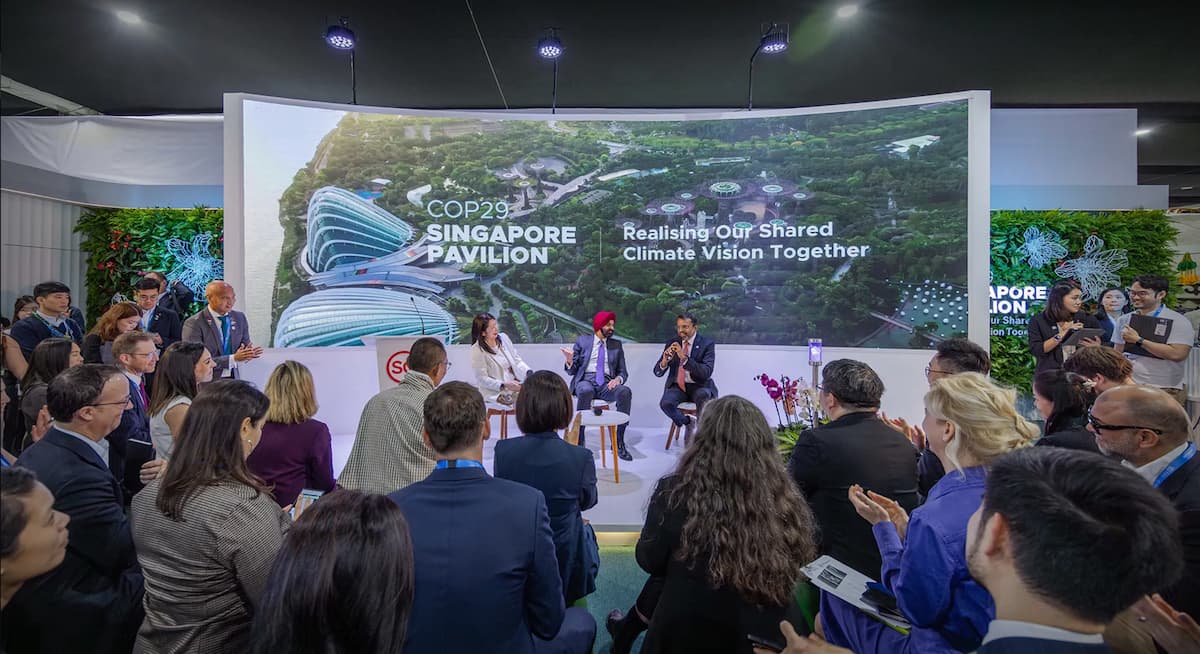
The Singapore Pavilion at COP29 invites experts from around the world to discuss climate issues. (Photo: COP SG Pavilion)
Thailand seeks more financial resources, international collaboration
Thailand, led by the Minister of Natural Resources and Environment, Chalermchai Sri-on, aims to increase cooperation with other countries on climate change responses and secure financial support. The country is also set to raise its carbon reduction target to 60% as part of an updated Nationally Determined Contribution (NDC).
Pirun Saiyasitpanich, Secretary-General of the Office of Policy and Planning, stated that Thailand’s emission reduction strategy will be based on 2019 levels, rather than future emission projections. He also mentioned discussions on simplifying carbon credit trading during the conference.
Thailand presented its National Adaptation Plan (NAP) to the UN, which covers areas such as water management, agriculture and food security, tourism, public health, natural resources and environmental management, and human settlements and security. Pirun emphasized that the country would compare its approach with international standards to ensure alignment.
Furthermore, Thailand plans to discuss its Climate Change Act and Transparency Report at the conference. Pirun noted that while Thailand has a clear plan in place, more time is needed to see tangible results, including the creation of an ecosystem that supports emission reductions—requiring new policies, tools, and national consensus.
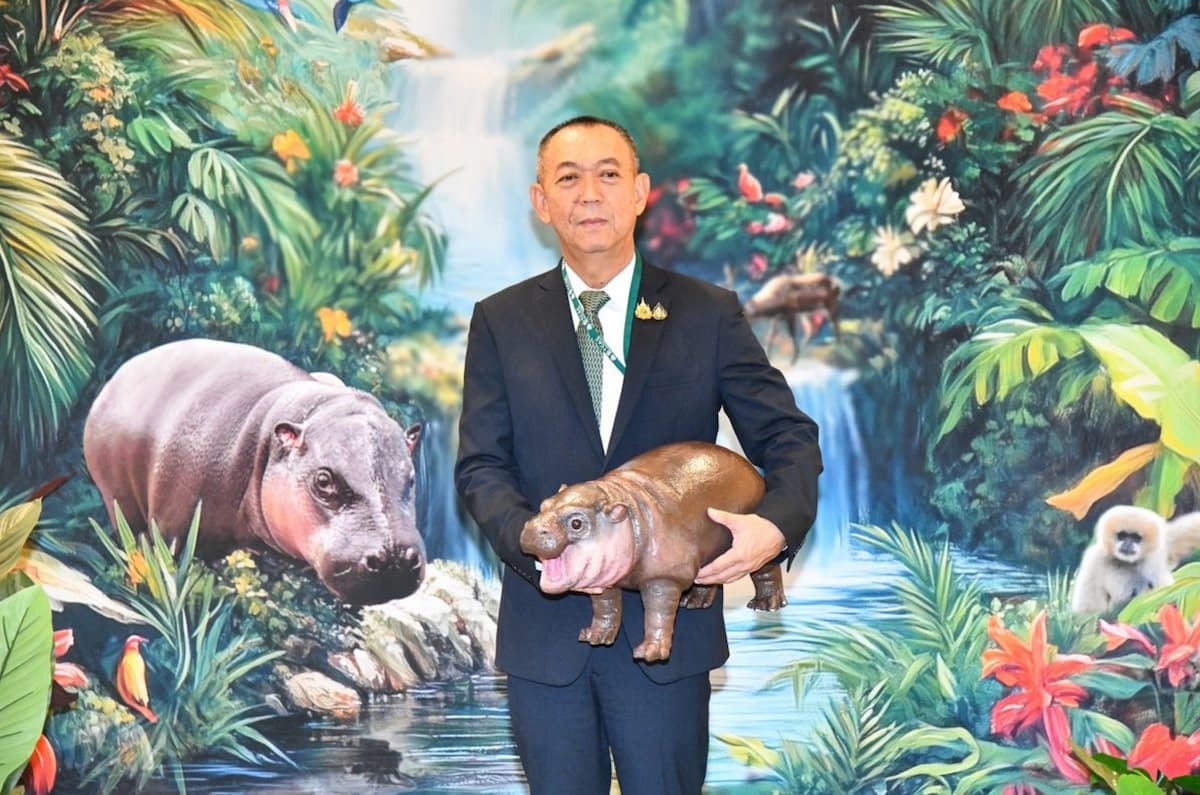
The Thailand Pavilion at COP29 features climate initiatives, activities, and souvenirs inspired by baby pygmy hippo "Moo Deng". (Photo: Thai government website)
Indonesia closely watches carbon market development
Indonesia's delegation to COP29 is led by Hashim Djojohadikusumo, the brother of President Prabowo Subianto, who serves as the special envoy with delegation from the Ministry of Environment and Forestry.
During the opening event at the Indonesian Pavilion, Hashim conveyed President Prabowo's statement, emphasizing Indonesia's commitment to continuing the agreements made during the administration of former President Joko Widodo.
Hashim also highlighted Indonesia's future priorities in wind, hydro, geothermal, solar, and nuclear energy, aiming to generate 75 GW of renewable power over the next 15 years.
The Indonesian Pavilion at COP29 is themed "Sustainably Stronger Together," highlighting the country's achievements in renewable energy development, carbon capture technologies, and reforestation projects.
In line with the COP29 focus on climate finance, Hashim pointed out that Indonesia's carbon reserve is as high as 577 million tons, which could serve as an incentive for attracting investment. The day before, the Minister of Environment, Hanif Faisol Nurofiq, emphasized the importance of this visit to track the progress of carbon market framework development and encourage the normalization of carbon trading.
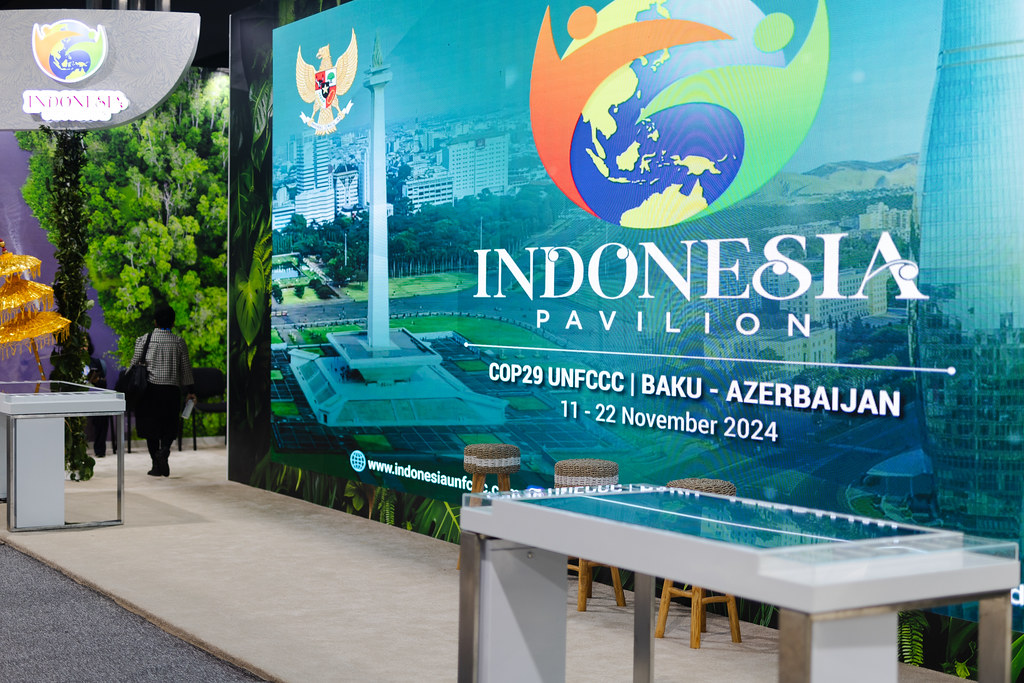
Indonesia's Pavilion at COP29 in 2024. (Photo: COP29)
Malaysia to urge developed countries to keep climate finance commitments
Malaysia, in a press release, stated that its pavilion at COP29 focuses on seven core sectors, strengthening the country's commitment to green economic development as outlined in the 2025 national budget.
It also expresses support for the carbon tax policy to be implemented in 2026, aiming to encourage the adoption of clean technologies and attract sustainable investments, thereby elevating Malaysia's position in the sustainable development sector.
Before departing for COP29, the Minister of Natural Resources and Environmental Sustainability, Nik Nazmi Nik Ahmad, mentioned that Malaysia would focus on the unmet financing commitments of developed countries and work to create more opportunities for businesses to attract investment for the development of a low-carbon economy.
He also noted that Malaysia plans to sign several cooperation agreements, both domestically and internationally, during the conference and aims to achieve the country's net-zero target by 2050 through the Climate Change Bill and the National Adaptation Plan.
Source: ANTARA(1)、(2)、BERNAMA、The Sun、The Straits Times、Channel News Asia、The Nation、EDB、MAS、PNA(1)、(2)、COP29
Published: November 12, 2024
Last Updated: November 14, 2024








